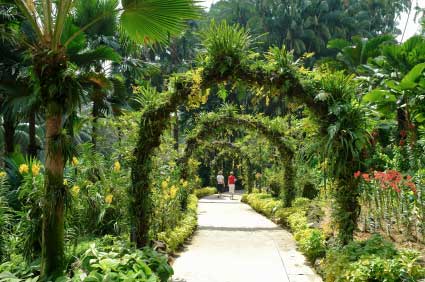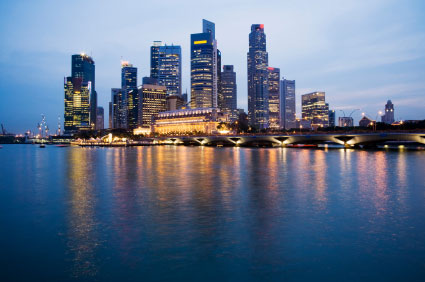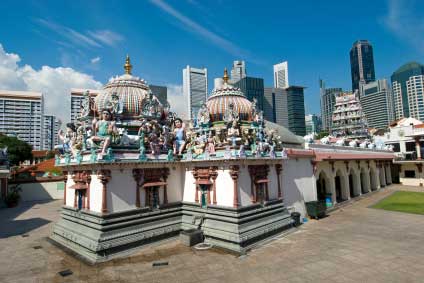Singapore is a popular expat destination, considered by many to be the financial epicentre of South-east Asia. It’s easy to enjoy a comfortable and rewarding life in Singapore. Living in the buzzing and vibrant city, expats will often find that commuting to work is never a hassle, with a short journey the norm. It is one of the fastest regions of economic growth and business prospects are plentiful. In fact, recent studies have shown that Singapore is the number one destination for British expats. Part of Singapore’s allure is the decidedly British feel it still retains, years after separating itself from the waning British Empire back in 1965. This will include a local cricket or rugby team, an English pub and many of your favourite foods from home, all intermingled with fabulous South East Asian cuisine and culture.
Over the years, Singapore has undergone tremendous transformation from a primitive fishing village to a fast-paced, well run cosmopolitan paradise. Singapore now has incredibly low levels of crime and very low levels of pollution. The government has made tremendous strides in maintaining these standards and as a result Singapore is one of the cleanest and safest cities in all of Asia. With an economy that continues to grow at a stable rate and a tolerant, multi-cultural society, Singapore proves to be an ideal destination for the discerning expat.

Weather in Singapore is generally hot but the months of November through to January will see heavy rainfall due to the monsoon climate that is prevalent. It is generally humid and warm throughout the year as Singapore is classed as having a tropical rainforest climate, being located only 85 miles north of the equator.
Employment, Work Permits and Visas
Singapore is very open to foreigners seeking employment on its shores; 22 percent of the service sector is made up of foreign workers and the same can be said of 44 percent in manufacturing. Singapore has attributed its incredible growth to seeking out skilled foreigners in sectors such as: science, banking, electronics, info-tech, digital media, law, healthcare and tourism. There is a Strategic Skills List available to view on Singapore’s Ministry of Manpower website which outlines different skills and positions that are in demand currently. Foreigners who possess these skills will have more weight behind them when applying for visas and work permits. Many large multi-nationals, including GlaxoSmithKline and IBM, have offices in Singapore and these companies often search for talented foreigners to join their ranks.
With regards to work permits and other documentation needed to work in Singapore, you will find that there aren’t as many restrictions as some other expat destinations. However if you extend your stay illegally or do not have the correct paperwork you may swiftly find yourself in a spot of bother. To obtain work in Singapore you have the option of going through various channels depending on what type of employment you are seeking. The ‘Work Pass’ scheme is split into different categories. If you work as a professional, executive or in a specialist sector then you will require the P or Q Pass. For mid-level employment you will need the S Pass and if you don’t qualify for S then you will need the R Pass. If you are an entrepreneur and are interested in starting your own business in Singapore then the EntrePass is for you. For trainees there is the Training Employment Pass. You will also need to acquire passes for any dependants who you will be travelling with; either a Dependant Pass, Letter of Consent or Long Term Social Visit Pass. A basic pass is the simple Work Permit. This is for people who will be earning no more than SGD$1,800 per month.
Business Culture
Luckily for the UK expat English is the standard business language, and is widely spoken throughout the country. The other recognised languages in Singapore are Mandarin, Tamil and Malay.
Like many Asian countries Singapore is fairly formal and conservative when it comes to business. This will differ from company to company as there is quite a mix of ethnicities residing and working in Singapore. However you will find that the majority of foreigners in Singapore are of Chinese descent, and this has a large effect on the way business is conducted, with many practices borrowed from Chinese culture. Strong emphasis is placed on building personal relationships in Singapore. Take all the networking opportunities that come your way so that you can establish good connections. Accept all invitations to functions, lunches, dinners and parties and the Singaporean business faithful will warm to you quickly.
When in the workplace be aware that like many Asian countries a heavy emphasis is placed on hierarchy and status. Older employees and your seniors should always be treated with great respect. A strong team mentality is also present as the needs of the masses will outweigh the needs of an individual; most important decisions are made as a group.
Working as an expat in Singapore you will find that your tax responsibilities are based on the following factors: your tax residency, your income and if your home country is connected to Singapore via a tax treaty. If you work in Singapore for more than 183 days in the year then you will be classed as a resident and thus taxed so.
Accommodation
When you come to looking for accommodation you will find that there are restrictions on foreigners buying land in Singapore. You will only be able to purchase an apartment in a building that has at least six floors. To purchase a larger, landed property you will have to gain permission via the controller of residential property land dealings. Property prices in Singapore have recently suffered a downturn, along with the rest of the world, through a little research you will be able to find property guides to assist you if you do indeed wish to buy. There are many housing estates in Singapore and if you choose to rent during your stay you will most likely end up in one of these estates. There is even a scheme in place to aid expats looking for accommodation called the Housing of Foreign Talent. Known as SHIFT, the scheme gives foreigners the option of renting HDB (Housing and Development Board) flats at a discounted rate. To reap the rewards of SHIFT you must satisfy the following requirements: highly skilled or professional worker, graduate, student, and have been in Singapore for no more than two years and do not own any property.
The types of properties on which there are no restrictions include: properties that have been classed by the Planning Act as a condominium development or an apartment in a building with at least six floors. Properties that are restricted include: any vacant land, landed properties such as terraced or semi-detached houses and bungalows and apartments in buildings with less than six floors
The Faber Park and Clementi areas of the west coast of Singapore are popular with expats and are both conveniently located near the financial hub of the city. They are quiet, relative to the city centre and thus perfect for families. In the central area, Bukit Timah is favoured due to its location. It has a dense population but those looking for good nightlife might enjoy being in the middle of town. As it is in the centre, Bukit Timahs transport links are excellent; it serves as a central hub for the rest of Singapore.

Transport
If you are motorist, be aware that it is expensive to own and maintain an automobile in Singapore. This is due to the already congested roads which have led the government to regulate vehicular activities. You will have to purchase a certificate of entitlement if you wish to own an automobile. These certificates are obtained via a bidding system and can be fairly expensive, up to SGD$14,000 (£6200). Registration fees can be pricey and there are also the costs of parking and ERP (essentially like London’s congestion charge) to factor in. Parking can prove to be difficult with limited spaces in busy areas.
Whilst it may be unfeasibly expensive to own a car in Singapore the government have counteracted this by making their public transport system incredibly efficient. The bus and train systems set in place are definitely the easiest ways to travel around Singapore. There are two train systems and a day and night bus service. There is also a premium bus service that guarantees you a seat, and even at extra cost this is far cheaper than owning a car or using taxis.
Healthcare
Singapore’s healthcare system is in line with the rest of the country in that the Government has invested much time and money to ensure its citizens can be proud of the high standards. There are 28 hospitals, 2,000 healthcare centres and numerous other specialist clinics located in the region. There is a balanced level of service available with both private and public healthcare on offer. Dental care is completely private so perhaps you could consult your peers to find a good dentist. There are also a number of International Patient Service Centres specifically for international patients. As private healthcare can be fairly expensive it is recommended you ensure any healthcare package you have in place is updated before venturing to Singapore.
Permanent residents have full access to the public healthcare system (all workers pay a ‘national insurance’ type tax to pay for this). However it is not free, but heavily subsidised according to job and income level.
Education
Singapore has the honour of being one of the safest cities in the world and is famed for its high standard of education. As an expat you will have the option of sending your children to some of the best state, private and international-curriculum schools in Southeast Asia. If you opt for Singaporean schools your children will follow a similar path to the education system in the UK. Primary school lasts for six years with the child then moving onto five years of secondary education. Unlike English education, the child will take exams at the end of primary school to determine what kind of subjects they take at secondary level. At the end of their secondary tenure the pupils will take GCSE exams, just like the UK. After secondary there is the option of taking A-Levels or studying for a four year diploma. For the less academic there are schools that specialise in fine arts as well as sports academies and also theatre studies. School fees were recently revised in Singapore and now foreign students will have to pay SGD$1,260 (approx £500) a year for primary school and SGD$3,720 (£1500) for secondary education.
Singapore has some excellent international schools. Demand is high due to the large amount of foreign workers and the quality is well renowned. An example of this is the International School Singapore which caters for pre-school to secondary education. They offer an international baccalaureate curriculum that is recognised throughout the world. Insworld School follows the UK curriculum and offers GCSE and A-level qualifications.
Entertainment and Lifestyle
Singapore is viewed as one of the most exciting places to live at the moment, whether you enjoy a busy social life or prefer to spend your spare time relaxing, you will find it easy to meet these ideals in Singapore. The unofficial national activity for Singaporeans is visiting the cinema, their appetite for movies is voracious! There are many cutting edge cinema complexes with luxurious big screens catering to all kinds of movie-goers ranging from the latest Hollywood blockbusters to more home grown fare.
Singapore also has the honour of housing some of the best beach resorts found on Earth. On these resorts you’ll find much in the way of activity be it beach sports, lovely outdoor restaurants and of course long stretches of golden sand to relax on. There are also many nature walks to take if you enjoy such pastimes. The Botanic Gardens are popular and there are usually a number of activities to engage in, from walks to tai-chi sessions.

Singapore is a vibrant and exciting place in the day and at night. Come the evening you will have a number of different establishments to entertain you regardless of taste. There are a host of bars, pubs, restaurants and nightclubs ready to play host to your desires, the biggest nightclub being Zouk, closely followed by Ministry of Sound and James Power Station. Due to sin tax, alcohol is very expensive in Singapore. Standard of living is very high and all your shopping and leisure needs will no doubt be catered for.
The Singaporean embassy in the UK can be found here: http://www.mfa.gov.sg/london/

